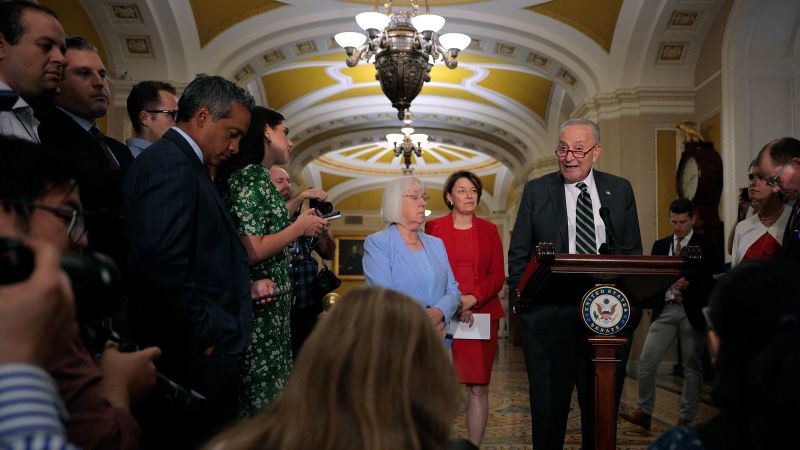Senate Democrats are currently employing a rarely used procedural tool to push the Department of Justice (DOJ) for the release of additional materials related to the notorious Jeffrey Epstein case. This strategic move comes as lawmakers approach their month-long August recess, aiming to keep the conversation around this controversial topic alive. Their efforts underscore the escalating frustration within the Democratic Party regarding transparency from the Trump Administration as they continue to probe into Epstein’s high-profile connections and past activities.
In a pointed letter addressed to Attorney General Pam Bondi, Senate Minority Leader Chuck Schumer, alongside fellow Democrats from the Senate Homeland Security Committee, demanded that the DOJ disclose all documentation pertaining to Epstein. These documents are expected to include audio recordings, video footage, as well as any other pertinent materials that might shed light on the case. The urgency of their request was emphasized by their statement expressing the need for transparency following previous failures and missteps from the DOJ concerning the release of these files.
In their correspondence, the Democrats stipulated that the requested documents must be handed over no later than August 15, while making provisions to ensure the protection of victims’ identities. Additionally, they are seeking a briefing from the DOJ by August 29, underscoring the importance they place on understanding the details surrounding the Epstein case and the implications it might have for broader judicial and societal concerns.
This ongoing probe utilizes a law nearly a century old, enabling five or more members of the Senate Homeland Security Committee to solicit information from the administration, even when in the minority position. This provision, however, has not been frequently utilized, leading to questions about its effectiveness in ensuring the production of documents amid potential adversarial responses from the DOJ.
The Democratic Party is keen to maintain the focus on the Epstein files and their ramifications as a pivotal point of contention for President Donald Trump, particularly as they view it as a measure of his ability to manage this sensitive issue, especially among his typically steadfast supporter base. In parallel actions, a House Oversight subcommittee has moved toward subpoenaing the Epstein files through a bipartisan vote, indicating that the Democratic Party is seeking to leverage this momentum across various congressional committees.
Despite these efforts, sources indicate that the Justice Department is unlikely to comply with the Democrats’ request for the Epstein files, raising doubts about the feasibility of their initiative. The matrices of success for the Democrats’ demands are intertwined with the administration’s willingness to disclose information willingly, as historical precedents suggest that court interventions have rarely led to favorable outcomes in similar situations.
Congress has historically struggled to acquire documents and information from the executive branch, particularly during the Trump administration. Past attempts have often culminated in prolonged litigation, negotiation, or fruitless outcomes. For instance, in 2017, a faction of House members litigated to obtain documents from the General Services Administration concerning its dealings with the Trump International Hotel in Washington, however, this effort saw mixed results.
Even as some courts acknowledged the right of Congress members to seek executive information, subsequent developments have seen the Biden administration adhering to the policies established by the previous Trump administration. These policies contend that individual members, specifically even ranking members on committees, lack sufficient legal authority to pursue information through the courts effectively.
Moreover, the Biden administration’s stance, as highlighted in a petition to the Supreme Court in 2022, indicated that members of Congress could leverage political avenues to influence an administration rather than relying solely on judicial action. This case was never heard by the Supreme Court, especially after the Biden administration acknowledged the demands from congressional Democrats, providing many of the documents initially sought.
As the situation evolves, it continues to bring to light the ongoing power struggles between the legislative and executive branches, illuminating the complexities of governance and accountability in contemporary American politics. The Epstein case not only reverberates through the halls of Congress but also serves as a broader metaphor for the challenges facing lawmakers in their quest for transparency and justice.











